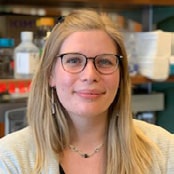Researcher Spotlight: Anouchka Laurent, PhD
Columbia University in the City of New York

Understanding the mechanisms and molecules involved in the formation of T-cell lymphomas (TCL) can illuminate new potential targets for drug development. Dr. Laurent’s research is focused on identifying genetic alternations in lymphoma and understanding how these changes lead to transformation of healthy lymphoma cells into cancer cells. Through her work, she has identified ID2 – a protein involved in regulating cellular processes related to growth and differentiation – as a potential target in TCL. “Our goal is to identify the mechanisms leading to ID2 overexpression, understand its role in T lymphomagenesis, and evaluate its potential as a therapeutic target for the treatment of [TCL],” she says.
Dr. Laurent completed her doctoral research at the Gustave Roussy Institute and the Paris Diderot University – Paris VII in France. She is currently a postdoctoral researcher at Columbia University in New York, NY, in the Institute for Cancer Genetics. Using multidisciplinary approaches, from single-cell analyses to studies in mouse models of lymphoma, her research focuses on studying the mechanisms that lead to malignant transformation, with a particular emphasis on peripheral TCL.
In the future, Dr. Laurent hopes to build on her experiences as an LRF Fellow to establish herself as an active researcher in the field of TCL. She is excited about the future of TCL research and the opportunities it illuminates to help people with these cancers. “Lymphoma research is a very dynamic field that [is becoming] more complex and challenging every day,” she says. “The perseverance of researchers to studying the mechanisms involved in lymphoma development and to enhancing tools to study them allows us to better understand these pathologies and develop more relevant and targeted therapies.”
